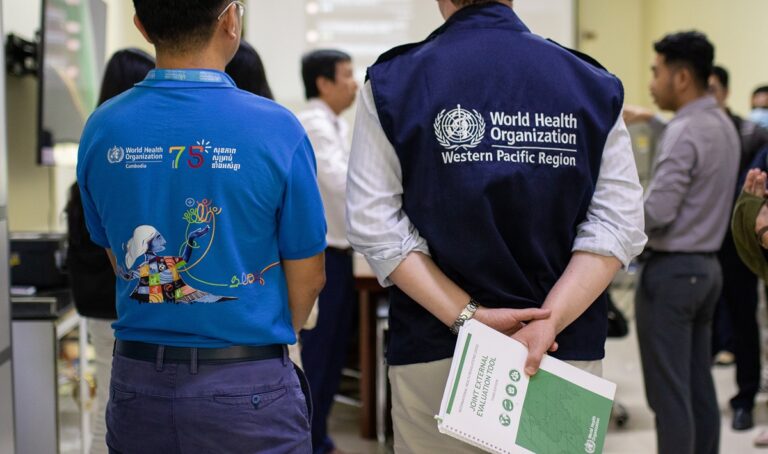In 2023, an unprecedented 340 million people worldwide will need humanitarian assistance, and WHO has helped Member States respond to more health emergencies than ever before. This harsh reality highlights that the world is not yet prepared for the next pandemic. To change this situation, all countries must have the capacity to prevent, rapidly detect, verify, notify and effectively respond to all public health threats.
Since 2023, Cambodia has faced multiple health-related events, including avian flu, measles, dengue fever, methanol poisoning, and annual floods. Rapid and continuing climatic and environmental changes, as well as political and economic shocks, have increased the risk of all-hazards and heightened health risks. Cambodia is conducting a comprehensive assessment of its health security core capabilities through the Joint External Evaluation (JEE) process to strengthen the country’s preparedness and response capacity.
The JEE is a voluntary, collaborative and multi-sectoral effort that serves as a strategic tool to identify areas for improvement in a nation’s health security system. Cambodia conducted its first JEE in 2016. The COVID-19 pandemic has posed challenges in fully implementing the JEE recommendations, but at the same time, it has also presented an opportunity to accelerate core International Health Regulations (IHR) capacity development in real time, and Cambodia has made significant progress in improving its capacity to address health security threats, as reported in the current JEE final score. In 2024, 59% of the 56 indicators, or 33, were assessed as capable and developed. This is an increase from the 2016 JEE report, where only 42% of the 48 indicators, or 20, were assessed as such. Although the results are not directly comparable, Cambodia has improved capacity in key areas, including surveillance, national laboratory systems, health service delivery, infection prevention and control, and emergency response management.
Dr Marianna Trias, WHO Representative in Cambodia, Prof Chheng La, Minister of Health of Cambodia, and JEE experts attended the final session of the workshop. © Ministry of Health of Cambodia
The JEE is essential for monitoring and evaluating core capabilities of the IHR. This year, as Member States update the IHR for the first time since 2005, Cambodia becomes the second country in the Western Pacific region to conduct its second JEE. This marks an important milestone not only for Cambodia, but also in the region’s efforts to improve its capacity to detect and respond to health threats.
The Ministry of Health’s Department of Infectious Disease Control, with technical assistance from WHO and funding from USAID, led the second JEE process, working with various ministries, agencies and partners to explore 19 technology areas.
“Health threats are a reality that cannot be ignored, but through preparedness and response plans and actions, we can control the future. Cambodia is committed to strengthening its health security through efforts like the Joint External Evaluation. Only by investing in preparedness and response today can we build a healthier tomorrow for all Cambodians,” said Dr. Ly Sovann, Director-General of the Department of Infectious Disease Control at the Cambodian Ministry of Health.
The second JEE, with updated tools based on lessons learned from the COVID-19 pandemic, enabled Cambodia to better identify more growth opportunities to improve areas such as fundraising, human resources, risk communication and community engagement.
The need to aggressively invest in health security before the next pandemic or global health threat occurs cannot be overemphasized.
“We applaud Cambodia’s transparent self-assessment and strong commitment to improving its health security capacity. Thanks to our success and continued collaboration, Cambodia is one of 50 partner countries identified in the Global Health Security Strategy launched by the White House in April 2024. Investing in health security will ensure a safer and healthier future for Cambodians and the global community,” said USAID Acting Mission Director Christopher Kelly.
“Over the past decade, Cambodia has made great strides in strengthening its capacity to manage health security threats as mandated by the International Health Regulations. To build on this progress, having a skilled and capable health workforce is crucial. We encourage the prioritization of a coherent package of human resources policies, strategies and plans, and will continue to work with the Royal Government of Cambodia to strengthen health security for a safer future for us all,” said Dr Marianna Trias, WHO Representative in Cambodia.
JEE survey results and recently finalized Asia Pacific Health Security Framework for Action, This will help identify and refine priority activities for future iterations. National Action Plan for Health Security; Development is expected in late 2024. However, building a more resilient health security system for all requires collaboration across health sectors. By taking these assessments and launching focused interventions through a whole-of-government and whole-of-society approach, Cambodia can pave the way to strengthening its capacity to prepare for and respond to public health threats.


